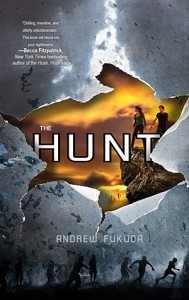Review


Gene is a human in a world of vampires. He has survived by living among them, going to school at night, sleeping in the day, and hiding his natural functions and mannerisms. When a lottery is announced, the prize a chance to hunt some captive humans, Gene is unexpectedly a winner. Now, Gene must find a way out of the hunt, while under the constant watch of people who would devour him in a second.
The Hunt has a great premise, and it’s good to see a different perspective on vampires. Early parts of the story regarding the lottery seem a bit too reminiscent of The Hunger Games, but fortunately the story focuses lest on the competition than on Gene’s alienation and rediscovery of his own humanity. The story certainly kept me reading, but problems with the underlying logic hampered much of my enjoyment.
There’s an earnest attempt at making the vampires unique for this story, but the depiction seems inconsistent. The vampires act almost human one moment, and then like complete monsters the next; it’s hard to believe that the sight of a food source (a human) would eliminate most rational thought. It’s also unclear whether vampires are born or made. There are vampire children and elderly, yet at one point it seems Gene’s father is going to transform into one after being bitten. The vampires also don’t sweat, yet they apparently urinate. It’s also odd that in a society not too different from our own, the vampires don’t seem to give each other names.
The world building is weak also. Being a vampire is the norm, and humans are considered extinct. How long has been the case? Is vampirism fairly recent, or have vampires dominated for most of history? There is also a strange mix of technology; the vampires have the internet, but no cars. How does email work if no one has a name? The vampires also refer to humans as “hepers” which doesn’t make much sense. The prefix “hepa” refers to the liver; does this mean the vampires don’t have livers?
The novel is still entertaining despite these inconsistencies, and there are some good hints at some larger mysteries. The Hunt has potential, but unfortunately its problems are a bit too many to ignore.
A review copy was provided through Goodreads.com First Reads program.
The Hunt has a great premise, and it’s good to see a different perspective on vampires. Early parts of the story regarding the lottery seem a bit too reminiscent of The Hunger Games, but fortunately the story focuses lest on the competition than on Gene’s alienation and rediscovery of his own humanity. The story certainly kept me reading, but problems with the underlying logic hampered much of my enjoyment.
There’s an earnest attempt at making the vampires unique for this story, but the depiction seems inconsistent. The vampires act almost human one moment, and then like complete monsters the next; it’s hard to believe that the sight of a food source (a human) would eliminate most rational thought. It’s also unclear whether vampires are born or made. There are vampire children and elderly, yet at one point it seems Gene’s father is going to transform into one after being bitten. The vampires also don’t sweat, yet they apparently urinate. It’s also odd that in a society not too different from our own, the vampires don’t seem to give each other names.
The world building is weak also. Being a vampire is the norm, and humans are considered extinct. How long has been the case? Is vampirism fairly recent, or have vampires dominated for most of history? There is also a strange mix of technology; the vampires have the internet, but no cars. How does email work if no one has a name? The vampires also refer to humans as “hepers” which doesn’t make much sense. The prefix “hepa” refers to the liver; does this mean the vampires don’t have livers?
The novel is still entertaining despite these inconsistencies, and there are some good hints at some larger mysteries. The Hunt has potential, but unfortunately its problems are a bit too many to ignore.
A review copy was provided through Goodreads.com First Reads program.





